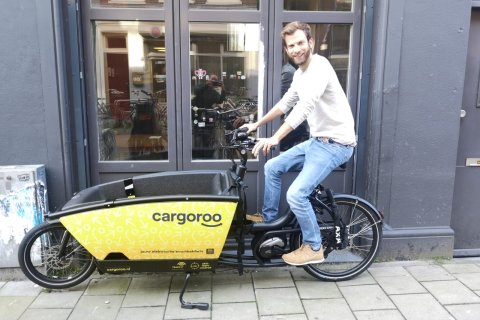Patterns of venture creation: data based insights for startups
Entrepreneurial Minds
With seven faculties Utrecht University offers several examples of entrepreneurial minds in all fields of study and research. From teachers and students to alumni and researchers, from Humanities to Bio-Inspired Innovation and often interdisciplinary. The Centre for Entrepreneurship inspires by showcasing the entrepreneurial minds within Utrecht University.

Dr. Lukas Held recently obtained his PhD at the Copernicus Institute of Sustainable Development by researching patterns in the processes that all starting entrepreneurs go through: venture creation. Nowadays, he combines the insights gained from his research with his love for large amounts of data as a business analyst at Cargoroo, a startup that tries to increase mobility in large cities with the use of shared electric cargo bikes.
What was your research about?
In short, I have described the process from having an idea to becoming a 'stable' company: profit is made, or the company is dissolved. I looked at the routes taken by entrepreneurs and the patterns that can be recognised in these routes: how is a startup team formed, how do entrepreneurs acquire financing and what approach do ventures take in product development. Compare it with taking a trip: do you take the car or the train, who do you travel with, how do you find these people, etc.?
This has been subject of many case studies, which have the downside that you can barely draw any general conclusions. In studies that used a large dataset, the individual story is quickly lost. For my PhD research, I have tried to find middle ground by describing the venture creation process for a large population.
To do so I interviewed 870 entrepreneurs from four European countries (Germany, Italy, the Netherlands and the United Kingdom) and the United States and obtained monthly status updates on the topics of team formation, acquiring finance and product development. I then applied Optimal Matching to these data, a methodology originating in genetics that searches for patterns in sequences. You count the so-called steps needed to get from one process to another. This way you map out the total number of processes and any overlapping 'routes'. The next step would be to compare these routes with certain types of companies and circumstances that starting entrepreneurs may have to deal with, so that an optimal process can be sought.
How is a startup team formed, how do entrepreneurs obtain financing and what approach do ventures take in product development?
What advice do you have for starting entrepreneurs, based on the results of your research?
Although it was not the aim of my research, there were a number of findings that could be interesting for entrepreneurs.
1. Growth is not everything
Every startup wants to be 'the next unicorn', but my data shows that it is all right to start modestly. Growth isn't everything, sometimes your idea or concept is more suitable for a company of limited size.
2. Start on a part-time basis
Seventy percent of the companies I researched were set up on a part-time basis: the entrepreneurs started their venture next to another (paid) job. In this way, starting a business is reasonably risk-free; you can test the water before you make yourself dependent on the intended or desired success.
3. Make substantiated choices in partnerships
Connecting your company to business partners can be advantageous, but many entrepreneurs don't realize that partnerships also costs resources. It's recommended to analyse what a partnership costs and yields, and to make a substantiated choice.
You now work as a business analyst at startup Cargoroo. How's that going?
Cargoroo offers a sharing system for electric cargo bikes (e-cargo bikes). We want to help solve the mobility problems in large cities. More and more cities are repelling cars out of the city centre and for many people, especially young families, it is no longer the obvious choice to buy a car or a second car. However, sometimes you have to transport heavy or large things over small distances, such as groceries. But you can also use our cargo bikes to take your children to the beach, to pick up something you bought on Marktplaats or to take a trip to Gamma or IKEA.
After a successful pilot in Haarlem, we just started in The Hague. We have obtained a European subsidy that allows us to expand to a number of European cities where there is a need for innovative solutions in the field of mobility. With Cargoroo we want to contribute to the mobility challenge, and really add something to the neighbourhood.
A lot of European cities are looking for innovative solutions in the field of mobility.
Can you apply the insights from your PhD research to your current job?
The processes I studied during my PhD research I now encounter in my work on a daily basis. Collaborating with external partners, or a technical problem, such as data sources that don't connect well together. Unforeseen circumstances.
It reminds me of my PhD research. To me it was clear how I wanted it to be beforehand: how my method fitted in nicely with the theoretical framework, which articles I planned on writing - and then things run their own course. You discover a mismatch between the data and the theory, or a hypothesis is rejected. As a researcher and as an entrepreneur, you are constantly working on problems large and small, that you have never thought about before.

